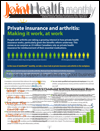In this issue
- Private Insurance and arthritis: Making it work, at work
- Understanding the obstacles of arthritis at work
- Private health insurance reform:
What it means for employees with arthriti - Reaching out to private health insurers
- What is the role of private health insurance companies and their advisors?
- What Can Employers Do?
- Health Happenings: Do you immunize?

People with arthritis are taking a growing interest in how private health insurance works, particularly given the benefits reform underway. This comes as no surprise as 23 million Canadians rely on private health insurance for reimbursement of their essential medications.

65% of Canadians obtain drug coverage through private insurance.

35% through provincial drug formulary
In this issue of JointHealth™ monthly, we take a closer look at private insurance and arthritis in the workplace.

A workplace environment that embraces the needs of people living with arthritis and provides private insurance plans that give timely access to medications is good for business health. Here's why:
You can reduce arthritis occurrence and workplace limitations at work and improve the quality of life at work for employees living with, or at risk of developing, arthritis
- Arthritis is the most common cause of work disability in Canada and typically occurs during prime working years, between ages 35-50.
- The impact of arthritis costs the Canadian economy more than $6.4 billion annually. Lost workdays due to long-term disability account for about two-thirds of this total.
- When an employer works with their private insurer to consider the health of employees living with inflammatory arthritis (rheumatoid arthritis, spondyloarthritis, psoriatic arthritis and gout), they are increasing their work candidacy pool by 2-3% (the percentage of people in Canada living with inflammatory arthritis).
- Within ten years of the onset of rheumatoid arthritis (RA), up to 50% of people living with RA are work disabled if left under treated or untreated.
- One out of every 100 Canadians - about 300,000 Canadians live with RA. An estimated 1 in 136 workers is living with RA, which will increase to 1 in 68 workers. Similarly, 1 in 6 Canadians has osteoarthritis, this will increase to 1 in 3 Canadians by 2020. By accommodating these workers' needs, the work force will remain stable, consistent, and local.
Understanding the obstacles of arthritis at work
Does this sound familiar? You have arthritis and you're having a difficult time at work. The obstacles of fatigue, pain, stress and depression seem insurmountable and lead to your inability to produce and meet deadlines. These and other obstacles often force employees with arthritis to leave the workforce earlier than planned, sometimes going on long-term or permanent work disability. Communication around the unique work challenges brought on by arthritis is important, yet the latest research tells us that employees living with arthritis often do not tell their employer about their disease because of concerns their disclosure could lead to discrimination and loss of employment.
 |
Physical Obstacles
|
 |
Mental Obstacles
|
Private health insurance reform:
What it means for employees with arthritis
The Canadian private health insurance environment is changing. Canadian workers living with arthritis are reporting challenges involving reimbursement of arthritis treatments, including:
Case management of drug claims - review of a physician's proposed treatment plan to ensure it is "reasonable"; identifying alternative treatments, monitoring adherence; limiting/declining payment.
Preferred provider pharmacy networks - requirement to purchase medications from specific pharmacies, a significant challenge for people living with arthritis who have restricted mobility.
Therapeutic substitution - substitution of one medication for another by a health professional other than the one who wrote the prescription.
Reference-based reimbursement - a requirement for the employee to pay the difference between the price of the medication prescribed by their physician and the one comparable to it listed on their extended health benefits plan.
Special authorization process - only a selection of medications will be covered by the benefits plan if the person meets specific criteria. Criteria can often be considered too restrictive and the process for approval too lengthy. Whether due to over restriction or delay, special authorization processes can jeopardize optimal treatment for employees with arthritis.
Reaching out to private health insurers
On behalf of its members, subscribers and JointHealth™ visitors, ACE is reaching out to private insurance companies who are receptive to learning more about arthritis and its impact on the workplace. At the end of April, ACE and its scientific partner, the Arthritis Research Centre of Canada (ARC), will be presenting an arthritis workshop at the Canadian Life and Health Insurance Association (CLHIA) Claims Conference in Quebec City.
Our presentation is part of our focus this year to help advance understanding of arthritis and its impact on private insurers, advisors, plan sponsors (employers) and plan members (employees). The arthritis community needs to work with private insurance stakeholders to ensure that strategies aimed to save money support optimal patient care by taking a holistic view of all cost drivers to the system.
Studies by ARC have found that early treatment with medications can reduce the short-term and long-term costs associated with arthritis, work-disability claims being largest among them. Quite often, appropriate arthritis medication or treatment can mean the difference between lifelong disability and return to a mostly normal life.
| According to Dr. Diane Lacaille, spending $25,000 per year for a biologic to control RA may seem prohibitive, but only until employers consider the cost of the illness itself, including decreased productivity at work, payment of disability benefits, and the loss of a skilled or valuable employee who needs to be replaced and retrained. Knowing this, the cost may actually be well worthwhile. |
Through education programs, ACE wants to engage with private insurers, advisors and plan sponsors to develop health benefit policies that provide reimbursement for an employee (or their family member) living with arthritis to cover the treatments their physicians say they require to keep them out of hospital, off short- and long-term disability and keep them at work. Ideally, like their co-workers, people living with arthritis will be able to lead productive lives and provide for themselves and their families.
| What is the role of private health insurance companies and their advisors? With a fuller understanding of arthritis in the workplace, private health insurers and advisors can provide plans with timely access to medications that ensure the beneficiary receives the care needed to maintain productivity, while reducing overall costs, including costly absenteeism and presenteeism in the workplace. |
|
| According to Benefits Canada, absenteeism occurs when employees do not show up for work. In contrast, presenteeism occurs when employees are physically present at work, but due to physical or emotional issues, are distracted to the point of reduced productivity. | |
What Can Employers Do?
Employers who understand the symptoms of arthritis (particularly inflammatory forms of the disease) and its seriousness are more likely to make adaptations in the work environment. Some high-value assistance that employers can offer include:
 |
Provide an ergonomic workplace
|
 |
Flexible hours at work
|
 |
Educate employees and employers about arthritis so everyone knows what support systems are available, including the employee benefits plan. |
 |
Improved reimbursement of prescribed treatments on the extended benefits plan
|
 |
Encourage/maintain good two-way communication with employees who live with arthritis. |

Do you immunize?
The slogan for this year's World Immunization Week - April 24-30 - is "Immunize for a healthy future: Know, Check, Protect." The World Health Organization (WHO) has developed the "World Immunization Week Poster Toolbox" to ensure this year's campaign reaches audiences globally through office, school, or healthcare centres, and online via social media. Please visit http://apps.who.int/immunization-week-posters/en/index.html to download the WHO posters.

At this year's Canadian Rheumatology Association Annual Meeting, Arthritis Broadcast Network conducted an interview with Dr. Gordon Dow, an Infectious Disease Specialist. Dr. Dow talks about the importance of vaccines and taking the "prevention approach", rather than being "reactive" when it comes to medical conditions. Five vaccinations Dr. Dow suggests for a person living with an autoimmune disease are:
- Influenza - helps prevent the common flu and should be taken every fall, for everyone six months or older
- Pneumococcal vaccine - helps prevent pneumonia
- Tetanus vaccine
- Human papillomavirus (HPV) vaccine - can prevent against human papillomavirus types that cause most cervical cancer
- Hepatitis A and B vaccine - prevents liver inflammation and long-term liver problems To view the complete video, please visit http://bit.ly/GordonDow. The video is available in English only.
The bottom line on vaccinations is this:
Do not take a "live" vaccine.
Listening to you
We hope you find this information of use. Please tell us what you think by writing to us or emailing us at info@jointhealth.org. Through your ongoing and active participation, ACE can make its work more relevant to all Canadians living with arthritis.
Update your email or postal address
Please let us know of any changes by contacting ACE at info@jointhealth.org. This will ensure that you continue to receive your free email or print copy of JointHealth™ monthly.
Arthritis Consumer Experts (ACE)
Who We Are
Arthritis Consumer Experts (ACE) provides research-based education, advocacy training, advocacy leadership and information to Canadians with arthritis. We help empower people living with all forms of arthritis to take control of their disease and to take action in healthcare and research decision making. ACE activities are guided by its members and led by people with arthritis, leading medical professionals and the ACE Advisory Board. To learn more about ACE, visit: www.jointhealth.org
Acknowledgements
Over the past 12 months, ACE received unrestricted grants-in-aid from: AbbVie Corporation, Amgen Canada, Arthritis Research Centre of Canada, BIOTECanada, Bristol-Myers Squibb Canada, Canadian Institutes of Health Research, the Canadian Rheumatology Research Consortium, Celgene Inc., GlaxoSmithKline, Hoffman-La Roche Canada Ltd., Janssen Inc., Pfizer Canada, Purdue Pharma L.P., Takeda Canada Inc., and the University of British Columbia. ACE also receives unsolicited donations from its community members (people with arthritis) across Canada.
ACE thanks these private and public organizations and individuals.
Disclaimer
The material contained on this website is provided for general information only. This website should not be relied on to suggest a course of treatment for a particular individual or as a substitute for consultation with qualified health professionals who are familiar with your individual medical needs. Should you have any healthcare related questions, you should contact your physician. You should never disregard medical advice or delay in seeking it because of something you have read on this or any website.
This site may provide links to other Internet sites only for the convenience of World Wide Web users. ACE is not responsible for the availability or content of these external sites, nor does ACE endorse, warrant or guarantee the products, services or information described or offered at these other Internet sites.
Although the information presented on this website is believed to be accurate at the time it is posted, this website could include inaccuracies, typographical errors or out-of-date information. This website may be changed at any time without prior notice.
